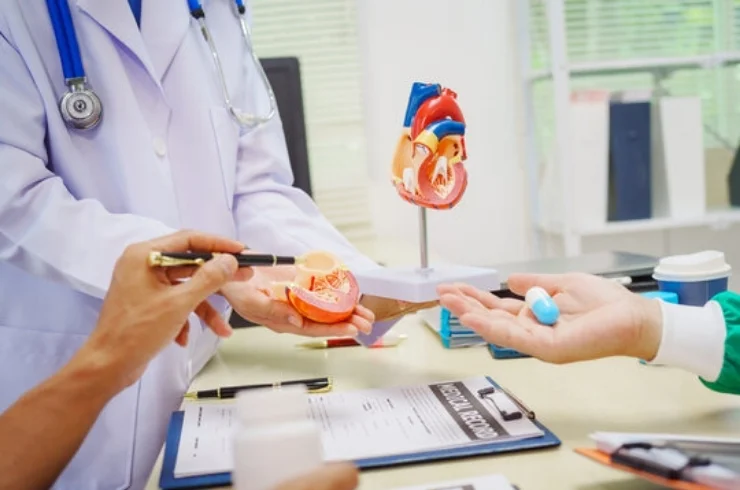Congenital Heart Defects

Congenital Heart Defects (CHDs) are structural abnormalities in the heart that are present at birth. These defects can range from simple issues like a small hole in the heart to more complex conditions that affect blood flow through the heart and to the rest of the body. At Kurnool Cardiac Center, we are committed to providing comprehensive care for congenital heart defects, from diagnosis to advanced treatments, ensuring the best possible outcomes for patients of all ages.
What Are Congenital Heart Defects?
CHDs occur during the early stages of fetal development, often before a woman even knows she is pregnant. While the exact cause isn’t always clear, genetic and environmental factors may play a role. Advances in medical technology have made it possible to detect and treat most CHDs, allowing many individuals to live full, healthy lives.
Types of Congenital Heart Defects
Atrial Septal Defect (ASD):
- A hole in the wall (septum) between the heart’s upper chambers (atria).
- May cause blood to mix between the two chambers, leading to increased workload on the heart.
Ventricular Septal Defect (VSD):
- A hole in the septum between the lower chambers (ventricles).
- Causes oxygen-rich blood to mix with oxygen-poor blood, leading to inefficiencies.
Patent Ductus Arteriosus (PDA):
- The ductus arteriosus (a normal fetal blood vessel) fails to close after birth.
- Leads to abnormal blood flow between the aorta and pulmonary artery.
Tetralogy of Fallot (TOF):
- A combination of four defects, including a VSD and narrowing of the pulmonary valve.
- Results in oxygen-poor blood being pumped into the body.
Transposition of the Great Arteries (TGA):
- The positions of the aorta and pulmonary artery are switched.
- Affects the normal flow of oxygen-rich blood throughout the body.
Coarctation of the Aorta:
- Narrowing of the aorta, restricting blood flow to the lower part of the body.
Hypoplastic Left Heart Syndrome (HLHS):
- The left side of the heart is underdeveloped, severely affecting blood circulation.
Symptoms of Congenital Heart Defects
Symptoms of CHDs vary based on the severity of the defect. Common signs include:
In Infants:
- Rapid breathing or difficulty feeding.
- Poor weight gain.
- Blue or pale skin (cyanosis).
In Older Children and Adults:
- Fatigue or shortness of breath during activity.
- Swelling in the legs, abdomen, or around the eyes.
- Heart murmurs or irregular heartbeats.
Some mild defects may not show symptoms until later in life, emphasizing the importance of regular heart checkups.
How Are Congenital Heart Defects Diagnosed?
At Kurnool Cardiac Center, we use advanced diagnostic tools to identify CHDs accurately:
- 2D Echocardiogram: A detailed ultrasound of the heart to visualize structural abnormalities.
- Electrocardiogram (ECG): Measures the heart’s electrical activity to detect irregular rhythms.
- Cardiac MRI: Provides high-resolution images for detailed assessment.
- Pulse Oximetry: Measures oxygen levels in the blood, a critical indicator for detecting CHDs.
- Fetal Echocardiogram: Diagnoses heart defects in unborn babies during pregnancy.
Early detection allows for prompt intervention and better management.
Treatment Options for Congenital Heart Defects
Treatment depends on the type and severity of the defect. Options include:
Medication:
- To manage symptoms like heart failure or irregular heartbeats.
- Common drugs include diuretics, beta-blockers, and ACE inhibitors.
Catheter-Based Interventions:
- Balloon Angioplasty: To open narrowed heart valves or blood vessels.
- Device Closure: To seal holes like ASDs or VSDs without surgery.
Surgery:
- Open-Heart Surgery: Repairs structural issues like valve defects or complex CHDs.
- Shunt Placement: Helps reroute blood flow in severe cases like Tetralogy of Fallot.
Heart Transplant:
- For rare, severe cases where the heart is too damaged to function.
Long-Term Care for CHDs
CHDs often require lifelong care, including:
- Regular follow-ups with a cardiologist.
- Lifestyle changes to support heart health.
- Monitoring for complications such as arrhythmias, infections, or heart failure.
Advances in medical care have improved the life expectancy and quality of life for individuals with CHDs.
Why Choose Kurnool Cardiac Center for Congenital Heart Defect Care?
At Kurnool Cardiac Center, our team, led by Dr. Nagendra Prasad Thota, combines expertise and compassion to deliver exceptional care. We offer:
- Cutting-edge diagnostic technology.
- Minimally invasive procedures for quicker recovery.
- Customized treatment plans for each patient.
- A focus on patient education and family support.
Your Heart Deserves Expert Care
Living with a congenital heart defect can be challenging, but you don’t have to face it alone. At Kurnool Cardiac Center, we’re here to guide you through every step of your heart health journey.
Schedule an appointment today to take the first step toward a healthier, stronger heart. Together, we’ll help you lead a life full of possibilities.
Treatments
- ECG
- 2D Echo
- TMT (Treadmill Test)
- Angiogram
- Angioplasty
- Bypass Surgery
- Heart Failure
- Valvular Heart Diseas
- Arrhythmias
- Cardiomyopathy
- Congenital Heart Defects
- Lipid Disorders
- Coronary Artery Disease
- Coronary Angioplasty and Stenting
- Percutaneous Coronary Intervention
- Coronary Artery Bypass Grafting
- Mitral Valve Repair or Replacement
- Atrial Septal Defect Closure
Consult Kurnool’s Leading Heart Specialist
Reach out to Kurnool Cardiac Center and meet Dr. Nagendra Prasad Thota for advanced diagnostics and treatment.
